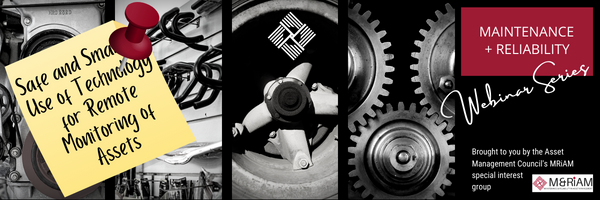by Heidi | Jun 11, 2024 | Events, Maintenance & Reliability in Asset Management, MRiAM News
If you couldn’t attend the Research and Industry Days (RAID) on May 30 and 31, you missed a successful and insightful online event. In collaboration with Federation University, this free event brought academia and industry together to share the latest research in maintenance and asset management.
(more…)
by Heidi | Aug 1, 2023 | Maintenance & Reliability in Asset Management, MRiAM News
Call for abstracts and papers for the Fourth International Conference on Maintenance and Intelligent Asset Management (ICMIAM2023) to be held in SMB Campus of Federation University Australia (FedUni), Ballarat (close to Melbourne), Australia, 6-8 December 2023 (www.icmiam.com). More information on how to submit an abstract available form the conference website and here.
by Heidi | Jul 27, 2023
Data driven sustainable asset management that applies a diagnostics algorithm to actively monitor the performance of solar electric power generation assets. This results in data driven maintenance activity decisions in combination with the asset owners’ financial interests, ensuring the optimum balance between performance and financial drivers.
About the speaker:
 Earl Duran, Tech Lead, Diagno Energy
Earl Duran, Tech Lead, Diagno Energy
Earl is a quantitative scientist whose thesis centered on exploring the drivers of climate change in Australia using climate big data. Today, he holds a key role as a Tech Lead at Diagno Energy, where he leads the development of a renewable asset optimization service, integrating his expertise in product development and machine learning. Earl and his team at Diagno Energy are addressing major inefficiencies in the operation and maintenance of solar and enhancing fault detection and diagnostic methods for commercial and industrial solar.

This session forms the final in a webinar series presented by MRiAM – Safe and Smart: Use of Technology for Remote Monitoring of Assets.
How do we remove people from dangerous conditions and situations and do our remote monitoring smarter? The Maintenance & Reliability in Asset Management special interest group presents this 5-part series where we look at different types of technologies that can be employed to reduce the risk to people and property.
Join us online and take the opportunity to look into techniques that are less familiar and can be adapted to your industry, or learn more about what others are doing within your own industry!
Registering for this session will register you for all five sessions in the series:
by Heidi | Jul 27, 2023
To mitigate the risk and impact of water pipe leaks and bursts in the Perth CBD, Water Corporation utilises remote active leak detection monitoring technology across selected distribution and reticulation water pipes. This remote monitoring provides a continuous acoustic visibility on the assets providing early detection capability for Non-Visible leaks and the protection of assets. This early detection of failures of the water pipes reduces the high cost reactive approach, enables mitigation or remediation decisions to be deployed prior to Functional Failure. In a high density environment such as the Perth CBD minimises asset, public safety, subsequential damage and customer impacts resulting from bursts or catastrophic failures.
Active leak detection monitoring in the Perth CBD is achieved by two remote monitoring deployments:
- Zonescan NB-IoT Correlating Acoustic Loggers, owned and maintained by Water Corporation utilising a Cloud Zonescan NET portal; and
- Treble Distributed Acoustic Sensing of leased fibre-optic cables, analysed and reported by an external service provider.
While the acoustic logger technology is used across the industry for monitoring, the use of fibreoptic is technology is new within the water industry but utilised within other industries for temperature and vibration remote monitoring.
This presentation will provide an overview of remote monitoring deployed for non-visible leak detection and protection of assets, and the benefits realised.
About the speakers:
Ian Gibb is an electrical Engineer working, for over 40 years on asset and network management, risk and performance activities, in the Electricity industry, jurisdictionally and nationally, and Water Utility industry in recent years.
Matt Ferguson is an environmental Engineer with over 10 years’ experience in Water industry, Environmental Service Delivery and Resources Sectors. More recently having an interest and focus on asset and network risk and performance.

This session forms the fourth in a webinar series presented by MRiAM – Safe and Smart: Use of Technology for Remote Monitoring of Assets.
How do we remove people from dangerous conditions and situations and do our remote monitoring smarter? The Maintenance & Reliability in Asset Management special interest group presents this 5-part series where we look at different types of technologies that can be employed to reduce the risk to people and property.
Join us online and take the opportunity to look into techniques that are less familiar and can be adapted to your industry, or learn more about what others are doing within your own industry!
Registering for this session will register you for all five sessions in the series:
by Heidi | Jul 27, 2023
This webinar will discuss emerging digital technologies and their role in mitigating risks to personnel in industrial settings. The primary focus is to explore how these technologies can be effectively deployed to enhance asset condition assessment while reducing risk to workers. Real-world examples will be discussed, addressing both the advantages and challenges associated with technology adoption. Our goal is to foster a safer working environment by harnessing the full potential of digital advancements in asset management.
About the speaker:
 Don MacIassac, Senior Integrity Engineer, Shell
Don MacIassac, Senior Integrity Engineer, Shell
Don has fifteen years of extensive experience in industrial asset inspection, encompassing the power generation, oil and gas, and water treatment sectors. His passion for digital technology lies in its dual potential: to enhance the quality of inspections and eliminate worker exposure to hazardous conditions. He currently supports Shell QGC’s Midstream LNG operation in Gladstone.

This session forms the second in a webinar series presented by MRiAM – Safe and Smart: Use of Technology for Remote Monitoring of Assets.
How do we remove people from dangerous conditions and situations and do our remote monitoring smarter? The Maintenance & Reliability in Asset Management special interest group presents this 5-part series where we look at different types of technologies that can be employed to reduce the risk to people and property.
Join us online and take the opportunity to look into techniques that are less familiar and can be adapted to your industry, or learn more about what others are doing within your own industry!
Registering for this session will register you for all five sessions in the series:

 Earl Duran, Tech Lead, Diagno Energy
Earl Duran, Tech Lead, Diagno Energy
 Don MacIassac, Senior Integrity Engineer, Shell
Don MacIassac, Senior Integrity Engineer, Shell